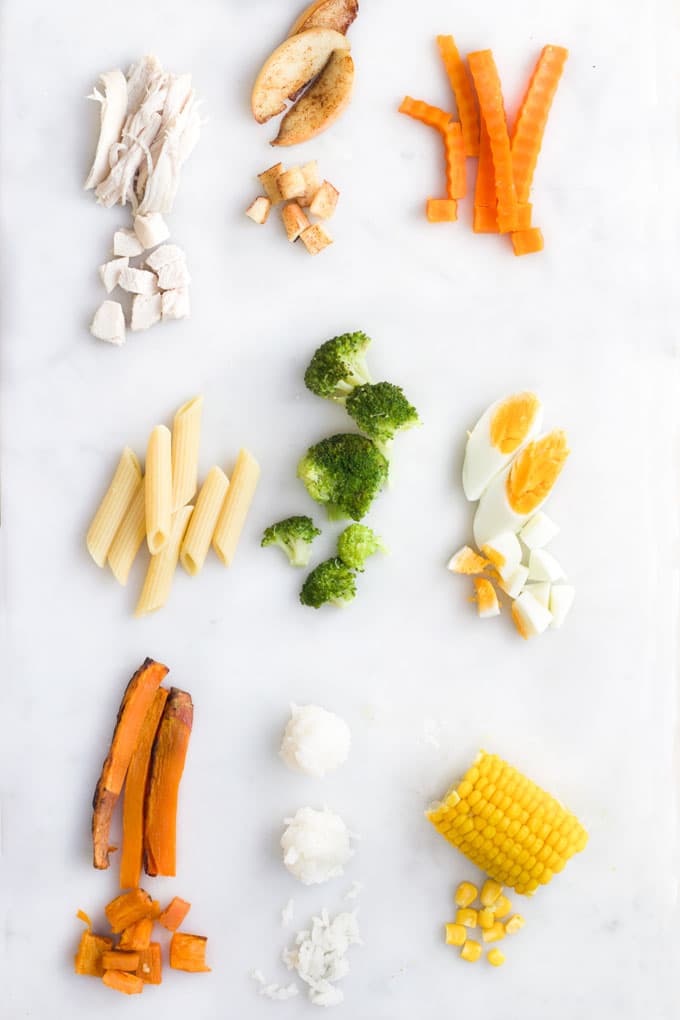Are you wondering how much baby food for 6 month old should be eating? Figuring out the right balance between solids and breastmilk or formula can be tricky, but we’re here to help. In this blog post, we’ll go over the recommended portions for babies between 4 and 7 months old, as well as tips for introducing new foods.
Introduction

Introducing your baby to solid foods is an exciting time for both you and your little one! Starting around the age of 6 months, babies are ready to begin learning about and exploring different tastes, textures, and colors of food.
It’s important to introduce a variety of nutritious foods early on so that your baby can develop healthy eating habits. While there is no one-size-fits-all approach to introducing solids, there are some general guidelines that can help make the transition easier.
When introducing solid foods, it’s important to start slowly with small amounts of food at each meal. Start with soft purees or mashed up pieces of soft finger foods like bananas or avocado and gradually increase the texture as your baby gets older.
Try offering a variety of fruits, vegetables, whole grains, proteins (like eggs), dairy products (like yogurt), and healthy fats (like olive oil). Avoid sugary snacks or overly processed items until later in life when your child has more experience with eating solids.
It’s also important to keep safety in mind when introducing solids – avoid potential choking hazards like nuts or hard pieces of food until after age 1 year old.
Keep an eye out for signs that your baby isn’t interested in a particular food; if he/she doesn’t seem interested after multiple tries, then it may be best to wait until another time before trying again.
Overall, introducing solid foods should be fun for both you and your baby! Make sure to enjoy this special time together as you explore new flavors and textures together!
Types of Food to Feed a 6 Month Old

It is important to start introducing solid foods to your 6 month old baby.
Breast milk or formula should still be their main source of nutrition, but introducing solids can help them get the nutrition they need and help them learn to eat.
Some good foods to start with are single vegetables and fruits that have been blended, mashed, or cooked.
Try giving your baby parsnip, broccoli, potato, yam, sweet potato, banana and avocado mashed together (Banacado), applesauce or cooked couscous.
Make sure that all food is soft enough for your baby’s developing teeth.
When starting solids it’s important to go slowly and offer just a few spoonfuls at a time. It’s also recommended to only give one new food at a time so that you can observe if there are any allergies or sensitivities.
Once your baby has gotten used to the food you can gradually increase the amount as well as introduce other foods one at a time. Make sure that all food is soft enough for your baby’s developing teeth.
Remember that it may take several tries before your baby really begins enjoying solid foods so don’t worry if they don’t seem too enthusiastic right away! Your little one will soon be enjoying a variety of wholesome meals!
How Much Fruit and Vegetables Should Be Consumed?

Fruits and vegetables should be an important part of your baby’s diet as they are packed with essential vitamins, minerals, and fiber.
Starting from 6 months old, offer your baby a variety of fruits and vegetables to ensure proper nutrition.
To ensure your baby is getting the right amount of fruits and vegetables, here are some guidelines:
6-8 Months: Start with 2-3 tablespoons of pureed fruit or vegetable per day. You can mix them together in combinations such as sweet potato and apple or carrots and peach.
9-12 Months: Increase to a half cup of pureed fruit or vegetable per day. At this age you can start introducing mashed/chopped fruits and veggies instead of purees.
1-2 Years Old: Offer one cup of chopped fruit or vegetable per day at this age. Soft cooked pieces work best for this age group but you can also start introducing raw fruits and vegetables if desired (make sure they are cut into small chunks).
2+ Years Old: Kids at this age should be eating 1-2 cups of fruit/vegetables daily. Incorporate a variety such as leafy greens, starchy veggies, legumes, citrus fruits, etc., into their meals throughout the week to ensure proper nutrition
Introducing Meat, Fish and Poultry

Introducing meat, fish and poultry to your baby’s diet is a great way to ensure they get the essential nutrients needed for healthy growth and development.
At around 6 months old, it’s recommended that you start adding pureed meats like chicken, beef, and turkey to your baby’s meals. Meat can be a solid option as their first food, offering protein, iron and other essential vitamins and minerals.
From 6-8 months old, feed your baby half a cup of soft food two to three times a day.
It is generally okay for babies to eat meat from around 6 months old but make sure that all fat, skin and bones are removed from poultry, meat and fish before serving them.
It is also important to avoid giving honey which should not be part of their diet until after one year of age. Oily fish such as salmon or trout should also be included in your baby’s meals from around six months as it provides essential fatty acids which are important for brain development.
To ensure that your baby receives all the necessary nutrients required during this stage of growth it is important to introduce them to a variety of foods including protein sources such as meat, fish and poultry.
Follow the recommended guidelines when introducing solids into your baby’s diet but always remember that every child develops differently so you may need to adjust the amount or type of food depending on how well they take it in!
When Can Babies Have Dairy Products?
Most parents wonder when they can start to introduce dairy products to their baby’s diet. Generally, most babies can start trying small amounts of dairy foods like yogurt and cheese around 6 months old if they have been eating other iron-rich solid foods.
It is recommended that breastmilk still remain a primary source of nutrition for the first year, so full-fat dairy products should not replace breastmilk or formula until the baby is 12 months old.
When starting solid foods with your baby, it’s important to choose products with no added salt or sugar. You should also begin by giving your baby two to three spoonfuls of soft and mashed food at each mealtime.
By six months old, babies usually feed every four to seven hours, so it may be beneficial to incorporate yogurt into a snack or a breakfast meal.
Overall, dairy can be an important part of your baby’s nutrition as they get older and more capable of eating solids. Before starting any new food though, you should always consult with your pediatrician to ensure that you are taking all the necessary precautions for introducing solids safely and correctly.
What About Finger Foods?

Introducing finger foods to your baby is an exciting milestone! Finger foods are a great way for babies to start learning how to self-feed and explore new tastes and textures.
When your baby is around 9 months old, they will be ready to try some finger foods.
Finger foods can include light and flaky cereals, crackers, puffs and soft pieces of fruit such as pears, apples, bananas, peaches, nectarines, mangoes and melons.
Protein sources like cheese, unsweetened plain whole-milk yogurt, tofu and beans are also good for your little one.
You can even offer them cooked vegetables like sweet potatoes smeared with coconut oil sprinkled with cinnamon that you’ve cooked in the microwave until very soft.
Scrambled eggs broken up into small pieces or spinach pancakes moistened with some breast milk are other great early finger food options for babies.
When introducing finger foods to your baby always make sure they’re cut into small pieces that won’t be too big or hard for them to swallow safely.
If you’re not sure if something is safe for your baby then it’s always best to consult with their pediatrician first before giving it to them. Finger foods can help give your baby a head start on self-feeding while also providing them with the nutrition they need so make sure you have plenty of fun options ready!
Is Organic Baby Food Necessary?
Organic baby food is becoming increasingly popular among parents, but is it really necessary? While research suggests that organic food may not provide any additional nutritional benefits, many parents still feel that it’s worth the extra cost due to environmental and health considerations.
Also Read: Everything Parents Should Know About Organic Baby Food
When should you introduce solid foods to your baby? Generally speaking, international recommendations suggest introducing solids between the ages of 4-6 months depending on the individual.
At 6 months, babies can take up to 8 ounces of food every 4-5 hours. It’s also important to remember that often times it’s much cheaper and just as nutritious to make your own versions of these same food combinations at home.
When it comes to purchasing organic baby food, many brands now offer organic options in puree, pouch and snack bar form.
While these premade options are certainly convenient and healthy, some parents prefer making their own homemade baby food for better control over ingredients or cost savings.
In conclusion, while there may not be any nutritional benefit associated with purchasing organic baby food products, many parents still choose this option for environmental or health reasons. Additionally, homemade baby food is a great way for parents to control their budget while ensuring their little one gets all the nutrients they need!
How Much Formula or Breast Milk Should I Give My Baby?

Choosing to feed your baby formula or breast milk is a personal decision. However, regardless of which you choose, it is important to know how much you should be giving your baby for each feeding.
For newborns up to 4 months old, it is recommended that they receive 2-3 ounces of either formula or breast milk per feeding.
This should be done every 2-3 hours in the first days of life.
Also Read: Why is breastfeeding so important?
For babies between 4 and 6 months old, generally 3-5 ounces of either breastmilk or formula should be given during each feeding.
For babies who are 6 to 9 months old, nearly all their calories should still come from either breastmilk or formula. It is recommended that they receive 6-8 ounces of either at each meal and before bedtime; however, they can begin eating solid foods such as mashed vegetables and fruits as well at this age.
It is important to remember that babies know when they are hungry or full and should be fed whenever they let you know they are ready for a meal!
What Nutrients Does My 6 Month Old Need in Their Diet?

It’s important to provide your 6-month-old with a balanced and nutritious diet. Breast milk or formula should still be the primary source of nutrition at this age, but you can begin to introduce solid foods as well. Your baby needs a variety of nutrient-rich foods to support healthy growth and development.
At 6 months, your baby needs carbohydrates for energy, protein for muscle growth and development, fat for brain development and growth, vitamins like A and C for immunity, minerals like iron for cognitive development and fiber to help digestion.
Good sources of these nutrients include grains such as whole wheat breads or cereals; vegetables such as carrots or broccoli; fruits such as apples or bananas; legumes such as lentils or black beans; seeds like flaxseed or chia seeds; nuts like almonds or walnuts; dairy products like yogurt or cheese; and meats like chicken or fish.
Start by feeding your baby small amounts of these foods in the form of purees that are easy to digest. You can also offer finely chopped pieces that are soft enough for them to gum down on their own. Be sure any meats are fully cooked through before serving them to your child. As they get older they may be able to eat finger food versions of these items as well.
By providing your 6-month-old with a variety of nutrient-rich foods you can ensure that they get all the vital nutrients they need in order to grow up healthy!
Can I Make my Own Baby Food at Home?

Making your own baby food at home is a great way to ensure that your little one is getting the best nutrition possible.
It’s also an easy and cost-effective way to provide fresh, wholesome meals for your baby.
With a few basic kitchen tools and some simple recipes, you can make delicious, healthy meals for your baby that are free from additives and preservatives.
Also Read: How long does homemade baby food last at room temperature ?
You can start making homemade baby food as early as 5-6 months old.
When starting out, it’s best to focus on single ingredient recipes such as fruits and vegetables purees.
Over time, you can begin adding in other ingredients like grains or meats for a more varied diet.
To make the purees, you can use a blender or food processor with a strainer attachment, or you can mash them using a fork or potato masher.
If preparing all of your own baby food seems too daunting of a task, there are also many store-bought options available that feature organic ingredients and no added preservatives or fillers. Just make sure to read labels carefully before purchasing any products for your little one!
What to Avoid Feeding a 6 Month Old Baby
It is important to avoid certain foods when feeding a 6-month-old baby. These include honey, cow’s milk, pure fruit juice, nuts and seeds, large pieces of food that could choke the baby, and anything containing added sugar or salt. Feeding your baby these types of food can be dangerous for their health.
Honey – Honey can contain a bacterium called Clostridium botulinum which can cause infant botulism. This is a serious illness affecting the nervous system and is potentially fatal. It is best to wait until your baby is 12 months old before giving them any honey.
Cow’s Milk – Cow’s milk should not be given as a drink until your baby is at least 12 months old as it does not contain enough iron for the needs of an infant.
Pure Fruit Juice – Pure fruit juice should not be given to babies under 6 months old as it contains too much sugar, which can lead to tooth decay and diarrhoea in babies at this age.
Nuts and Seeds – These should not be given as whole items as they pose a choking hazard for babies under 5 years old. However, nut butters such as almond butter are fine after 6 months once the texture has been thinned down with breast milk or formula for example.
Large Pieces of Food – Any solid foods you give your baby should always be cut into very small pieces or mashed up so that they cannot choke on them; even if your baby has started teething this rule still applies!
Added Sugar/Salt– It is best to avoid giving your 6-month-old any food with added sugar or salt in it
Signs of Allergies and Intolerances

Food allergies and intolerances can affect babies from a very young age. The most common signs of an allergy or intolerance in infants include hives, a red itchy rash, wheezing and coughing, swelling in the lips, eyes or face, vomiting and abdominal pain.
In milder cases of eczema, it is recommended to introduce highly allergenic foods like peanut products at 4-6 months old.
If you notice any signs of an allergic reaction such as hives, vomiting or difficulty breathing, seek medical attention immediately. It is important to keep track of any symptoms that appear after eating certain foods so that your baby’s doctor can provide the best treatment plan for them.
Conclusion

At around 6 months of age, your baby is ready to start trying solid foods. This can be a exciting time for both you and your baby as you introduce them to new flavors and textures.
Formula-fed babies will typically feed about six to ten times each day, while breastfed babies may nurse less often but for longer periods of time.
Experts recommend starting solids when a baby is about 6 months old, depending on the individual child’s development and readiness. It is important that your baby learns how to swallow food before they are given solid foods. Early initiation of breastfeeding within one hour of birth is also recommended by experts.
From 6 months onwards, babies are just beginning to learn how to swallow food. Milk should still be their staple at this point and you can start by introducing small amounts of easy-to-digest pureed foods such as fruits and vegetables.
Your child should eventually move onto more advanced finger foods and textures as they get older. It is important that you follow the recommended guidelines from healthcare professionals when introducing solid foods to your baby in order to ensure safe eating practices and healthy nutrition habits!



